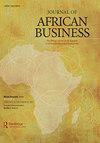非洲正式和非正式创业研究的综合框架
IF 1.8
Q3 BUSINESS
引用次数: 4
摘要
摘要:援助正规和非正规部门的企业家,以提高他们的业绩和增长,这是许多撒哈拉以南非洲国家政府的既定做法。不幸的是,政府并没有达成一致的方法来区分企业家,并针对他们制定适当的促进政策。因此,尽管有良好的意愿,但创业政策举措的目标不正确,执行不力,而且没有取得预期的结果,因为不同的创业者可能需要不同形式的援助。一些学者认为,如果没有具体的分类指南,政策制定者对特定晋升举措的潜在候选人的增长能力的评估就不太可能准确,这可以解释一些政策失败的原因。这一观察为本论文提供了动力。我们的目标是提供一个框架,帮助确定影响SSA中正式和非正式企业创建过程的不同背景维度。本文章由计算机程序翻译,如有差异,请以英文原文为准。
An Integrative Framework for Formal and Informal Entrepreneurship Research in Africa
ABSTRACT It is a well-established practice of many Sub-Saharan African (SSA) governments to aid entrepreneurs within both the formal and informal sectors to enhance their performance and growth. Unfortunately, there is no agreed method by which governments can differentiate between entrepreneurs and target them with the appropriate promotion policies. Thus, despite the good intentions, entrepreneurship policy initiatives have been incorrectly targeted, poorly implemented, and without the desired results, since different entrepreneurs may require different forms of assistance. Some scholars have suggested that without a context-specific classificatory guide, policymakers are unlikely to be accurate in their assessment of the growth capabilities of prospective candidates for specific promotion initiatives and this can explain some of the policy failures. This observation has motivated the present paper. Our objective is to provide a framework that helps identify the different contextual dimensions influencing formal and informal enterprise creation processes in SSA.
求助全文
通过发布文献求助,成功后即可免费获取论文全文。
去求助
来源期刊

Journal of African Business
BUSINESS-
CiteScore
4.60
自引率
10.50%
发文量
36
期刊介绍:
Journal of African Business is the official journal of the Academy of African Business and Development, the largest network of professionals committed to advancement of business development in African nations. JAB strives to comprehensively cover all business disciplines by publishing high quality analytical, conceptual, and empirical articles that demonstrate a substantial contribution to the broad domain of African business. Regardless of the research context, tradition, approach, or philosophy, manuscripts submitted to JAB must demonstrate that the topics investigated are important to the understanding of business practices and the advancement of business knowledge in or with Africa. Particularly, JAB welcomes qualitative and quantitative research papers. JAB is not, however, limited to African-based empirical studies. It searches for various contributions, including those based on countries outside Africa that address issues relevant to African business. Targeted toward academics, policymakers, consultants, and executives, JAB features the latest theoretical developments and cutting-edge research that challenge established beliefs and paradigms and offer alternative ways to cope with the endless change in the business world. Covered areas: Accounting; Agribusiness Management and Policy; Business Law; Economics and Development Policy; Entrepreneurship and Family Business; Finance; Global Business; Human Resource Management; Information and Communications Technology (ICT); Labor Relations; Marketing; Management Information Systems (MIS); Non-Profit Management; Operations and Supply Chain Management; Organizational Behavior and Theory; Organizational Development; Service Management; Small Business Management; Social Responsibility and Ethics; Strategic Management Policy; Technology and Innovation Management; Tourism and Hospitality Management; Transportation and Logistics
 求助内容:
求助内容: 应助结果提醒方式:
应助结果提醒方式:


